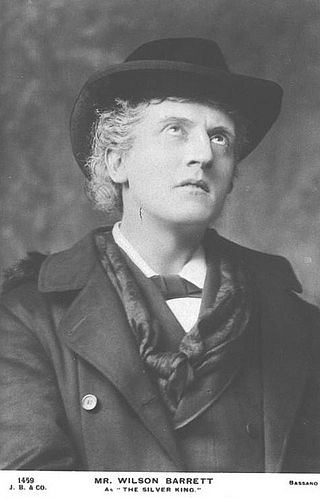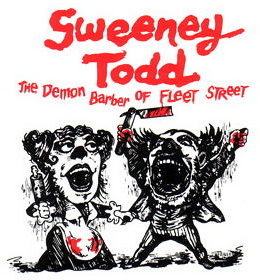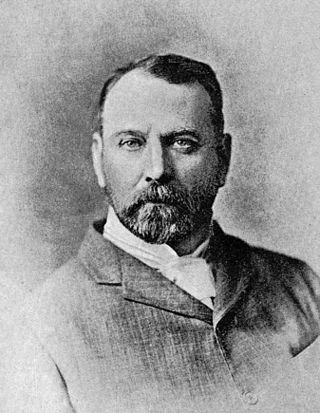
The Savoy Theatre is a West End theatre in the Strand in the City of Westminster, London, England. The theatre was designed by C. J. Phipps for Richard D'Oyly Carte and opened on 10 October 1881 on a site previously occupied by the Savoy Palace. Its intended purpose was to showcase the popular series of comic operas of Gilbert and Sullivan, which became known as the Savoy operas.

Wilson Barrett was an English manager, actor, and playwright. With his company, Barrett is credited with attracting the largest crowds of English theatregoers ever because of his success with melodrama, an instance being his production of The Silver King (1882) at the Princess's Theatre of London. The historical tragedy The Sign of the Cross (1895) was Barrett's most successful play, both in England and in the United States.

Porgy and Bess is an English-language opera by American composer George Gershwin, with a libretto written by author DuBose Heyward and lyricist Ira Gershwin. It was adapted from Dorothy Heyward and DuBose Heyward's play Porgy, itself an adaptation of DuBose Heyward's 1925 novel of the same name.

Lawrence Barrett was an American stage actor.

Henry Arthur Jones was an English dramatist, who was first noted for his melodrama The Silver King (1882), and went on to write prolifically, often appearing to mirror Ibsen from the opposite (conservative) viewpoint. As a right-winger, he engaged in extensive debates with left-wing writers such as George Bernard Shaw and H.G. Wells.

George Robert Sims was an English journalist, poet, dramatist, novelist and bon vivant.
Golden Boy is a drama by Clifford Odets. The play was initially produced on Broadway by The Group Theatre in 1937. Odets' biggest hit was made into a 1939 film of the same name, starring William Holden in his breakthrough role, and also served as the basis for a 1964 musical with Sammy Davis, Jr.

Sweeney Todd: The Demon Barber of Fleet Street is a musical with music and lyrics by Stephen Sondheim and a book by Hugh Wheeler. It is based on the 1970 play of the same name by Christopher Bond. The character of Sweeney Todd first appeared in a Victorian penny dreadful titled The String of Pearls (1846-7).
Judy Kaye is an American singer and actress. She has appeared in stage musicals, plays, and operas. Kaye has been in long runs on Broadway in the musicals The Phantom of the Opera, Ragtime, Mamma Mia!, and Nice Work If You Can Get It.

Sydney Grundy was an English dramatist. Most of his works were adaptations of European plays, and many became successful enough to tour throughout the English-speaking world. He is, however, perhaps best remembered today as the librettist of several comic operas, notably Haddon Hall.

The Belle of Mayfair is a musical comedy composed by Leslie Stuart with a book by Basil Hood, Charles Brookfield and Cosmo Hamilton and lyrics by George Arthurs. The story is inspired by the Shakespeare play Romeo and Juliet.

Gentlemen Prefer Blondes is a musical with a book by Joseph Fields and Anita Loos, lyrics by Leo Robin, and music by Jule Styne, based on the best-selling 1925 novel of the same name by Loos. The story involves an American woman's voyage to Paris to perform in a nightclub.

Three New York City playhouses named Wallack's Theatre played an important part in the history of American theater as the successive homes of the stock company managed by actors James W. Wallack and his son, Lester Wallack. During its 35-year lifetime, from 1852 to 1887, that company developed and held a reputation as the best theater company in the country.

Caroline Lucreza Brook Hill was an English actress. She began acting as a child in the company of Samuel Phelps and soon joined the company of J. B. Buckstone at the Haymarket Theatre. There she created roles in several new plays, including some by W. S. Gilbert, in whose plays she continued to act later in her career. She played at various London and provincial theatres in the 1870s. Hill married actor Herbert Kelcey in 1883, with whom she had begun to appear on stage. The couple played mostly in New York City in the 1880s, and, mostly in England, Hill continued to act through the 1890s.

The Harold Pinter Theatre, known as the Comedy Theatre until 2011, is a West End theatre, and opened on Panton Street in the City of Westminster, on 15 October 1881, as the Royal Comedy Theatre. It was designed by Thomas Verity and built in just six months in painted (stucco) stone and brick. By 1884 it was known as simply the Comedy Theatre. In the mid-1950s the theatre underwent major reconstruction and re-opened in December 1955; the auditorium remains essentially that of 1881, with three tiers of horseshoe-shaped balconies.

Connie Ediss was an English actress and singer best known as a buxom, good-humoured comedian in many of the popular Edwardian musical comedies around the turn of the 20th century.

Lights of London is a 1923 British silent drama film directed by Charles Calvert and starring Wanda Hawley, Nigel Barrie and Warburton Gamble. The film is based on the 1881 stage melodrama The Lights o' London by George Sims and was made at the Lime Grove Studios.
Lights of London is a 1914 British silent drama film directed by Bert Haldane and starring Arthur Chesney, Phyllis Relph and Fred Paul. The film is based on the 1881 stage melodrama The Lights o' London by George Sims and was made at Ealing Studios. The play was again turned into a silent film in 1923.

Marie Jansen was an American musical theatre actress best known for her roles at the end of the 19th century. She starred in a number of successful comic operas, Edwardian musical comedies, and comic plays in New York, Boston, Philadelphia and London during the 1880s and 1890s.
Henrietta Elizabeth Spiers was a British costume designer for the theatre and silent films, a screenwriter, and an author. Columbia University's Women Film Pioneers Project counts her among those on its list of 'Unhistoricized Women Film Pioneers'.
















